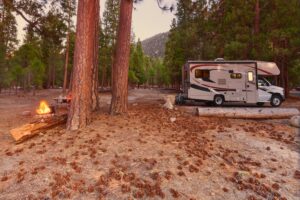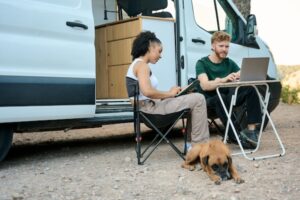Reliable Wi-Fi Is Becoming a Must-Have Feature for Modern RV Owners
Expanding wireless technology can help your customers stay online, even in remote locales.

Have your dealership customers told you that they dream of a digital nomad’s life? They might want to wake up at a remote campsite nestled under fragrant pines, sipping coffee while the sun rises before opening their laptops to get to work. No office cubicle. No long commute. Just an RV and the freedom to work wherever the road calls them. It’s the dream turned reality for a rapidly growing group of mobile professionals.
Sounds idyllic, right? But there’s a catch. This RV lifestyle is only possible with one crucial ingredient in place: your customers need reliable Wi-Fi.
The Rise of Digital Nomads & Mobile Professionals
For some time, rigid 9-to-5 office jobs haven’t been the only way to earn a living. And by 2030, experts expect that the number of jobs that you can do from anywhere will increase by 25%. Writers, designers, teachers, marketers and entrepreneurs are all turning their laptops into portable offices to build a life around travel and flexibility.
Not all digital nomads travel in RVs, but these vehicles certainly embody the growing movement because they provide both a home and mobility. RVs are nothing like hotel rooms or short-term rentals. They’re a comfortable home base that end users can personalize however they want. What’s more, they allow people to wake up to new views and explore breathtaking locations every day.
RVs offer a lot, but they may not promise a reliable internet connection. In a café or hotel lobby, Wi-Fi is usually provided. Unfortunately, digital nomads often drive themselves to the middle of nowhere, only to find that connectivity is sparse at best.
Why National Parks, Campsites & Rural Destinations Remain Connectivity Dead Zones

Some of the most inspiring places to work include our national parks and out-of-the-way campgrounds. These quiet destinations are gorgeous but notorious for their lack of reliable connectivity.
It’s an issue that digital nomads know all too well. While the romantic image of working from a mountaintop or forest cabin is compelling, the reality often involves scrambling for a signal or relying on expensive cellular hotspots that still may not deliver consistent speeds.
The digital nomad’s lifestyle still outpaces infrastructure in many areas. Cellular networks often have limited towers in remote regions. Many protected areas choose to forgo internet infrastructure by design, restricting the installation of cables and cell towers to preserve the area’s natural beauty. This leads to dead zones where signals fade altogether.
Campgrounds may offer connections, but they tend to rely on public Wi-Fi networks. If an Rver is setting up their rig in a spot with multiple guests, the network can easily become congested.
Digital connection makes or breaks a mobile professional’s viability. For full-time RVers, it’s not just about convenience. They need the freedom to work wherever the road leads.
How 5G & Emerging Technologies Are Poised To Bring Change
Fortunately, change is at hand. The rollout of 5G wireless technology is dramatically improving internet speed, reliability and coverage for RV owners.

5G mobile networks can deliver internet speeds up to 10 times faster than we’re used to. Thanks to lower latency, GPS navigation and streaming will be smoother and more responsive.
You know how 4G gets bogged down in crowded areas? That’s not true about 5G networks. They maintain steadier connections, even in busy campgrounds, and can handle multiple devices simultaneously, making them perfect for families or digital nomads with numerous gadgets on the road.
No, 5G isn’t everywhere, but it is expanding. Networks are even making their way into rural locations where many RVers boondock or camp off-grid. Many RV owners are supplementing their connectivity by investing in portable 5G hotspots, signal boosters and satellite internet services. These complement cellular networks and help fill in coverage gaps, offering digital nomads more consistent and stress-free connections.
Supporting Reliable Wi-Fi for the Future of Flexible Living
We see promising steps forward. Still, bridging the digital divide for mobile professionals requires coordinated action. Internet service providers, technology companies and policymakers each have a part to play.
Broadband expansion tends to favor urban and suburban areas because customer density promises higher returns. Now it’s time for providers to focus on emerging and cost-effective ways to offer internet access for rural parks, campgrounds and remote routes. Their investment in satellite internet, 5G networks and mobile hotspots would go a long way to help bridge the gap.
Tech companies can join in by creating portable, high-performance internet hardware specifically designed for RVs. Devices that combine mobile hotspot capabilities, signal boosters and seamless network switching empower RV owners to maintain steady connections no matter where they park. And that tech is only part of the equation. Training and resources that help digital nomads optimize connectivity and troubleshoot tech issues would also enhance the RV lifestyle experience.
RV dealers can educate customers on the realities of Wi-Fi on the road, especially if they plan to go off-grid. Dealerships can also stock products for maintaining connectivity and for satellite internet.
The growing number of remote workers is challenging policymakers to take action. Grants and public-private partnerships can support internet infrastructure in national parks. Underserved rural areas can encourage this connectivity to increase tourism and support the local economy.
Some RVers dream of embracing the lifestyle of a full-time digital nomad. Maybe they just enjoy being a weekend wanderer. Whatever the case, the road ahead is exciting for RV owners, where work and adventure can become one.



